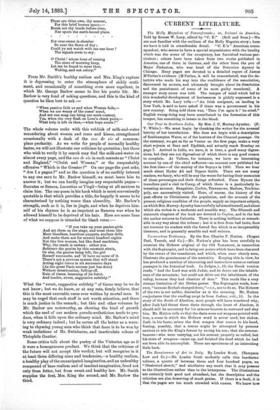Unconscious Testimony. By the Rev. Charles F. Hutton. (Kogan Paul,
Trenoh, and Co.)—Mr. Hutton'e plan has been carefully to examine the Hebrew original of the Old Testament, in connection with the Septuagint, and to bring out points which have been obscured by the errors of the translators, and which, when once clearly seen, illustrate the genuineness of the narrative. Keeping this in view, he has produced a number of interesting and instructive notes on various passages in the historical book. In Judges, i., 19, the Greek version reads, "And the Lord was with Judah, and he drive out the inhabit. ants of the mountain; but could not drive out the inhabitants of the valley, because they had chariots of iron." This reads like a very strange limitation of the Divine power. The Septuagint reads, how- ever, "because Rechab charged them,"—i.e., not to do so. The Hebrew of the two is not unlike, dissimilar as is the meaning. Mr. Hutton conjectures that the reading crept in from Joshua, xvii., 10. In the story of the death of Absalom, most people will have wondered why, after Joab had thrust three darts through the heart of Absalom, it should still be necessary for his armour-bearers to surround and slay him. Mr. Hatton tells 119 that the darts were not weapons pointed with iron, a sense in which the Hebrew word is never used, but stakes.
Joab, in his haste, seizes the first weapon that comes to his hand, fearing, possibly, that a rescue might be attempted by persons anxious to win the King's favour by saving his son ; that the armour- bearers—who were carrying, not his armour, properly so called, but his store of weapons—came up, and finished the deed which he bad not been able to accomplish. These are specimens of an interesting little book.


































 Previous page
Previous page